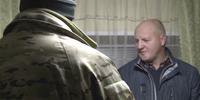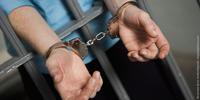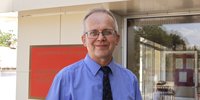The Case of Ursu in Dzhankoy
Filter
- #
- #
Judge of the Kiev District Court of Simferopol Denis Didenko authorizes the conduct of the ORM at Victor Ursu.
- #
At 6 a.m., at least 11 security officers come to the house of the Ursu family in Dzhankoy. At least four of them are armed. No one presents their official IDs. For some time, the spouses are not allowed to get dressed.
Law enforcement officers begin an inspection of the entire household, including the attic, basement and garage. Electronic devices, the Bible, and religious literature were confiscated from family members.
In response to a request to show his passport, Victor Ursu asks the senior officer to show his service ID, which is refused. The law enforcement officer draws up an act of administrative offense against Viktor, regarding the request of the believer as disobedience to the order of a police officer. Judge Yelena Nikolayeva sends the believer to a temporary detention facility for 10 days.
- #
Victor Ursu is released from the temporary detention facility, he is again detained and taken for interrogation to the local branch of the Investigative Committee. There, investigator A. V. Gerasimov reports that a criminal case has been opened against him under Part 1 of Article 282.2 of the Criminal Code of the Russian Federation (organization of activities of an extremist organization).
Urs is charged. According to the ruling, the believer's guilt is that he and "other unidentified persons ... called propaganda meetings ... to discuss the texts and religious provisions of Jehovah's Witnesses."
After the interrogation, Viktor is again taken to the temporary detention facility.
- #
Judge of the Dzhankoysky District Court Oksana Sinitsyna sends Viktor Ursa under house arrest.
- #
As part of the criminal case against Victor Ursu, the house of Mikhail and Lyubov Gozhan is searched again, then Mikhail is interrogated. For the first time, security forces came to them as part of the criminal case against Sergei Filatov.
- #
The term of house arrest of Victor Ursu is coming to an end. The tracking bracelet is removed from it.
The prosecutor's office returns the believer's case to the Investigative Committee. According to the investigator, Ursu's case will be conducted by the deputy head of the Investigation Department in Cankoy.
- #
The deputy head of the Investigative Department of the Investigative Committee for Dzhankoy, D. P. Cherniy, decides to choose a preventive measure for Victor Ursu in the form of a recognizance not to leave and proper behavior.
- #
The case is being submitted to the Dzhankoysky District Court of the Republic of Crimea. It will be considered by Judge Elena Nikolayeva, who in the summer of 2023 sentenced Viktor Urs to administrative arrest for 10 days.
- #
The preliminary hearing is being held behind closed doors. Friends and relatives of Victor Ursu are waiting outside the courthouse. Among them are his elderly mother, who walks on crutches, and his 85-year-old father.
- #
Victor Ursu expresses his opinion on the accusation. He states: "I am not a criminal and not an extremist. For more than 50 years I have been living in the city of Dzhankoy, for 40 years I have been working as a milling machine operator at one enterprise - Dzhankoy wagon depot. At the place of residence and work, I am characterized positively. I take care of my elderly parents... Being one of Jehovah's Witnesses in Russia is not a crime." The defendant's parents, his wife and an elderly relative are present in the courtroom.
- #
Viktor Ursu highlighted that mentioning God's name does not mean belonging to a liquidated legal entity. He gives the example of a town park: "If complaints arose about the state of the park and it was closed for reconstruction, would anyone think of blaming people who go somewhere else to rest?"
- #
The prosecutor requests 7 years in prison for Viktor Ursu, basing the charges on the testimony of witnesses. At the same time, the defense draws attention to the fact that these people "did not confirm that the defendant had ever made statements against the state authorities or members of other religions about using violence against them, the need for genocide or repression."
The defense reminds the court of the mass repressions against Jehovah's Witnesses in the USSR, when just for their faith "thousands of people were deported without trial or investigation to various regions of Siberia, where in exile the defendant was born." The lawyer asks: "Is history repeating itself, which we should already have learned lessons from?"
Then Viktor Ursu makes a statement. He emphasizes that there was no motive of hatred or enmity in his actions: "Throughout my life I have striven and strive to build and unite, and not to incite enmity or destroy."
There are 20 people in the courtroom, as the judge allows the session to be held in a spacious courtroom.
- #
Viktor Ursu gives his final statement in court.
The Final Statement of Defendant Viktor Ursu in Dzhankoy - #
- #
Viktor Ursu was transferred to the Simferopol pretrial detention center.
- #
After 10 days of quarantine, Viktor Ursu is placed in a double cell. The believer has normal relations with prisoners and pre-trial detention center staff.
Viktor is feeling well. Daily walks help him in this, during which he enjoys the fresh air and sun, admires the sky. The man is worried about his mother's health and regrets that he did not have time to hug her after the verdict was announced.
The Bible was seized from the believer for checking. He wrote an application to visit the library. Ursu is supported by letters. His cellmate, a military major, was surprised that Viktor began to receive letters the very next day after the verdict, on September 9, when the prisoner himself had not yet been taken to the pre-trial detention center.
Viktor had two short-term meetings with his wife.


